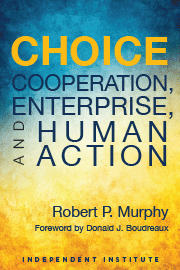Economist Abigail Hall is under fire for her defense of selling babies.
A research fellow with the Independent Institute, Hall makes a case for deregulating the adoption market in a post for the institute’s website, provocatively titled, “An Argument for ‘Selling’ Babies.”
We should pause to note the scare quotes in Hall’s title, but she does, in fact, argue that it should be permissible for prospective parents to pay birth mothers to give up their babies for adoption.
Some commenters absolutely flipped out, while others argued with great passion that Hall’s analysis could, mutatis mutandis, be used to justify the African slave trade. I would like to offer a qualified defense of Hall. The state should not interfere with the market for parenthood.
Right off the bat, notice that I have changed the description of the market. In retrospect, it is not surprising that so many people reacted with horror to Hall’s article: she invited it by explicitly talking about selling babies. It would have been more precise—and less provocative—to instead argue for selling parenthood: the caretaking of babies.
There is no doubt that there is bona fide selling being proposed; that’s why it didn’t make sense for Hall (or her editor) to put the quotes on that word. Rather, the reason Hall isn’t literally advocating the sale of babies is that babies are not actually the commodity.
Right now, parents do not own their children in a legal sense, and so of course there can’t be a market in which they could sell them. (In contrast, people legally own their pets. That doesn’t mean they have the legal right to torture them, but they definitely own them—that’s why we will refer to a dog’s “master” or “owner.”) What parents do possess is the legal recognition that they are the parents of a particular human being, and that relationship is what they currently have the legal ability to transfer to another, through the process of adoption. That is why it is much more precise to say that Hall is advocating a market in parenthood, not in babies.
Hall gives a standard economic argument for deregulating the adoption or parenthood market. There are many couples who cannot have children biologically, while the current expenses of adoption can be quite high. Further, in the existing regime of prohibition, many children are either aborted or remain in families where the parents neglect them. Although Hall doesn’t mention them, I note that right now there are kidnappings and rare but nonetheless gruesome cases of pregnant women being attacked and having their fetuses removed. Allowing prospective parents to augment the adoption process with side payments of cash would arguably improve things across all of these dimensions, just as surely as the most brutal aspects of the alcohol trade greatly diminished once Prohibition was lifted.
Economist Gene Callahan responded to Hall’s article with a reductio ad absurdum, showing that such arguments could just as easily have been used to rationalize—in cost-benefit terms—the African slave trade. In the comments, I called Callahan’s bluff. I noted that his case rested on the premise that African chiefs already had slaves, and then the only question was whether they should be allowed to sell them to others. With the debate so narrowly circumscribed, it’s arguably true that lifting prohibitions on trading would have been beneficial, even for the slaves.
To be sure, such an argument would not justify the underlying slavery itself. Callahan’s post derives all of its moral force from our revulsion to slavery, and yet he didn’t actually show that Hall’s arguments had any bearing on slavery per se; at worst, her arguments could justify selling slaves at a price above $0, rather than merely having the legal ability to transfer one’s slaves to another master without compensation.
Right now, some human beings have the legal status of parenthood vis-à-vis other human beings. Right now, it is perfectly legal to transfer that status to another willing party. Right now, it is even legal to accept financial compensation to effect such a transfer, so long as it is limited to the expenses of undergoing a healthy pregnancy and birth. Right now, it is also common for adoptive parents to pay tens of thousands of dollars to private-sector brokers and government bureaucrats to facilitate all of the above.
The only thing right now that is illegal is to make a pure side payment (i.e., not tied to out-of-pocket expenses) to the party giving up the parenthood. This is the point on which the critics put all of their moral weight, arguing that it is here that “slavery” begins.
Such hairsplitting is arbitrary. To be truly consistent, the critics should prohibit not merely side payments; they should also prohibit compensation for pregnancy and labor expenses, because those too run into a slippery slope of yuckiness where it starts to seem as if a birth mother is being paid to produce a commodity for a client.
We should also recognize that, overwhelmingly, the parenthood market would be a place where children are far more likely to be transferred from a parent who is less willing to provide love and care to one who is more willing. Whatever people think about money possibly sullying a process that we would prefer to be more altruistic, shouldn’t we at least give consideration to the fact that trying to ban the payment of money will in practice end up hurting the children?
I agree with Callahan and some of the outraged commentators on Hall’s original post, who would be appalled to live in a society where some rich couples flip through a catalog and order a custom-designed baby. But by the same token, I would prefer to live in a world where there is no prostitution or heroin abuse, not merely for my own sake, but for the souls of the people engaged in these activities.
Nonetheless, I recognize that in a free society, people will do things of which I disapprove. As immoral and degrading as an explicit “baby catalog” would be, I find it even more immoral and degrading that the agents of the state currently will throw people in cages if they are caught giving money to encourage an activity that is perfectly legal if done for free.









